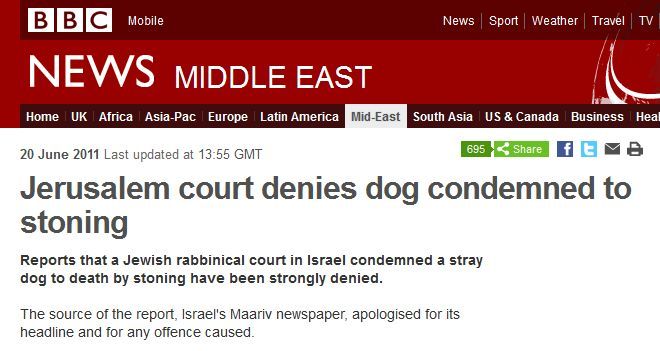We held to account those international media outlets that published what turned out to be a false story concerning the sentencing of a dog to be stoned to death. Within hours of HonestReporting’s communique, the Daily Telegraph removed the story in its entirety from its website. Time had already published an update.
The BBC, however, published a separate follow up article.

Did the BBC issue a correction? No.
Did the BBC admit that it had published a story from the Israeli press without verifying or fact checking in a professional journalistic manner? Of course not.
Was the BBC concerned that it had published the story after Israeli paper Ma’ariv had issued an apology and retraction? Not on your life.
Instead, in typical BBC fashion, it responded by turning the denials of the story from the Jerusalem rabbinical court into a story in its own right.
When will the BBC be big enough to admit when it has committed an error instead of wriggling out of an outright retraction?
You can send your considered comments to the BBC Complaints website. For more on how to navigate the complaints process, click here for our guide on how to make a complaint to the BBC.
UPDATE – 23 JUNE: Since this blog post was published the following has been posted on the BBC News Editor’s blog:
You may have noticed a headline in our “most popular” module about a dog being condemned to stoning in Israel. It was followed a few days later by a denial: Jerusalem court denies dog condemned by stoning. The first story has now been taken down. This is not a step we often take so I wanted to explain why we have done so on this occasion. We based our article on sources we have used in the past: Ynet, a popular Israeli website, and the news agency AFP. What we did not know when we wrote the story was that the Israeli Hebrew-language newspaper Maariv had already published a retraction and an apology. We failed to make the right checks. We should never have written the article and apologise for any offence caused. We have kept the story carrying the denial in the interests of transparency.
Nathalie Malinarich is world editor of the BBC News website.
While the BBC’s acknowledgment that it failed to make the right checks is welcome, we still question the motivation behind the follow-up story as being “in the interests of transparency.”
In addition, while the original story topped the BBC’s most popular items, who is likely to see this blog post hidden away in the depths of the BBC website?
Nonetheless, credit is due to the many of you who made the effort to send a complaint to the BBC. This acknowledgement on the BBC’s part is a rare display of humility on the part of a media behemoth that has previously been virtually impervious to criticism.
This is a small step in the right direction and vindicates HonestReporting’s highlighting when the BBC gets it wrong.
DAILY TELEGRAPH ACKNOWLEDGES THE ERROR
Unlike the BBC, the Daily Telegraph at least took the issue seriously. One HonestReporting subscriber received the following after he submitted a complaint:
Thank you for taking the time and trouble to write to us and to bring this to our attention. The article was first published in the Israeli newspaper Maariv and we suspended it as soon as we were alerted to the fact that they had taken it down. The article no longer appears online.
Today we published a further article highlighting Maariv’s retraction and the denials of the rabbinical court. I have attached a link below for your reference.
Please accept my apologies for any upset or distress this may have caused.


